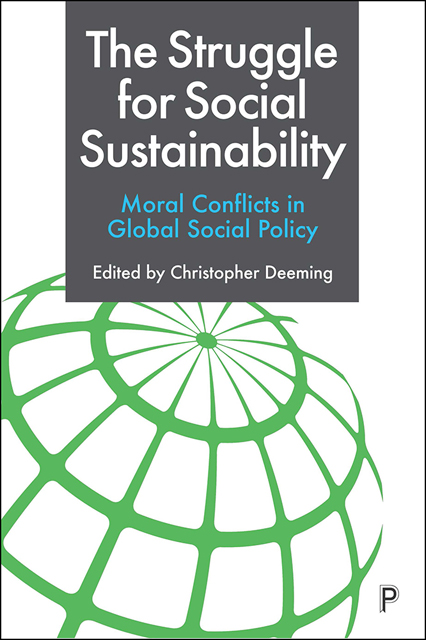Book contents
- Frontmatter
- Contents
- List of boxes, figures and tables
- List of abbreviations
- Notes on contributors
- Acknowledgements
- Preface
- 1 The ‘social’ in the age of sustainability
- 2 ‘No such thing as society’? Neoliberalism and the social
- 3 The social question: reconciling social and economic imperatives in policy
- 4 Disputing the economization and the de- politicization of ‘social’ investment in global social policy
- 5 The social dimension of sustainable development at the UN: from Brundtland to the SDGs
- 6 Paradigm lost? Blocking the path to ecosocial welfare and post- productivism
- 7 World population prospects at the UN: our numbers are not our problem?
- 8 Ageing sustainably
- 9 The political challenges to governing global migration and social welfare
- 10 Bringing in ‘the social’: an intersectional analysis of global crises and welfare
- 11 Global social policy and the quasi- concept of social cohesion
- 12 Putting the global in social justice?
- 13 ‘Go- social’? Inclusive growth and global social governance
- 14 For better or worse?
- 15 The struggle for social sustainability
- Index
9 - The political challenges to governing global migration and social welfare
Published online by Cambridge University Press: 14 April 2023
- Frontmatter
- Contents
- List of boxes, figures and tables
- List of abbreviations
- Notes on contributors
- Acknowledgements
- Preface
- 1 The ‘social’ in the age of sustainability
- 2 ‘No such thing as society’? Neoliberalism and the social
- 3 The social question: reconciling social and economic imperatives in policy
- 4 Disputing the economization and the de- politicization of ‘social’ investment in global social policy
- 5 The social dimension of sustainable development at the UN: from Brundtland to the SDGs
- 6 Paradigm lost? Blocking the path to ecosocial welfare and post- productivism
- 7 World population prospects at the UN: our numbers are not our problem?
- 8 Ageing sustainably
- 9 The political challenges to governing global migration and social welfare
- 10 Bringing in ‘the social’: an intersectional analysis of global crises and welfare
- 11 Global social policy and the quasi- concept of social cohesion
- 12 Putting the global in social justice?
- 13 ‘Go- social’? Inclusive growth and global social governance
- 14 For better or worse?
- 15 The struggle for social sustainability
- Index
Summary
Introduction
The political spotlight on immigrants’ use of social programmes seems to be growing brighter and brighter. A key argument for Brexiteers has been that leaving the European Union (EU) would eliminate the entitlements of EU citizens to British social programmes, Donald Trump has done his best to reignite anger about ‘illegals on welfare’, and government leaders across Western Europe objected to the admission of asylum seekers in the wake of the Mediterranean refugee crisis out of fear that it would place too much pressure on their welfare systems. Indeed, immigration increasingly complicates the social question, inviting dilemmas about the social protection different classes of residents deserve, and about the maintenance of solidarity in societies rife with intergroup tension. Considering the steep rise in global migration patterns projected by the United Nations (for example UN DESA, 2016) and the increasing success of anti-immigrant politicians, this development does not seem likely to abate any time soon.
This chapter reviews how immigration affects the politics of redistribution in Western democracies. The main argument is that the challenges of reconciling migration and welfare are aggravated by the political process. Migration raises complicated questions about the portability of social security arrangements and differentiation in social rights extension. The political sensitivity of issues of immigration and multiculturalism, however, makes it difficult to engage with such questions in a detached manner. The image of the burdensome immigrant has become common in media coverage, the sentiment that welfare should be reserved to native-born citizens is increasingly consequential, and politicians who favour extreme solutions are having a greater influence on policy decisions. For these reasons, it seems unreasonably optimistic to expect that the pressing questions immigration raises about the future of the welfare state will be tackled effectively.
The next section looks at the policy challenge that migration poses to the welfare system. It is then demonstrated that news media frequently depict immigrants as a drain on the system, and do so more now than they did three decades ago. The third section turns the attention to public opinion and shows that while the number of people who believe that immigrants are a leech on the system seems to be in decline, the sentiment is nevertheless having a larger impact on election outcomes.
- Type
- Chapter
- Information
- The Struggle for Social SustainabilityMoral Conflicts in Global Social Policy, pp. 177 - 194Publisher: Bristol University PressPrint publication year: 2021



